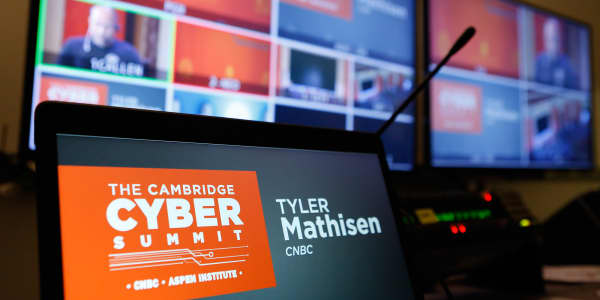The cyberwar over data escalates with each passing day and is impacting the governments and the global enterprises we all rely on in unprecedented ways.
Governments and businesses are waking up to a new reality — it is not if, but when hackers will target their organization. They face enemies that are nimble, motivated and well-funded, and have access to cyberweapons such as malware, ransomware and botnets with the click of a mouse.
Cybercrime will cost the global economy $445 billion in 2016 — more than the market cap of Amazon ($397 billion), Facebook ($368 billion) or ExxonMobil ($360 billion) — according to an estimate from the World Economic Forum's 2016 Global Risks Report.
With that backdrop, CNBC is co-sponsoring its inaugural Cambridge Cyber Summit, in partnership with The Aspen Institute and MIT, to be held Wednesday at MIT in Cambridge, MA.
The event will bring together law enforcement and government leaders from a range of public and private organizations. On the government side, the FBI, NSA and U.S. Cyber Command will be represented. From the private sector: SAP, IBM and Akamai, among others. They will be joined by academics and advocates from MIT, The Aspen Institute and the Electronic Frontier Foundation.
The threat is now widely understood to be real and growing, and increasingly touches on every facet of our connected world. Criminals have stolen almost a billion records in more than 5,000 data breaches since 2005, according to the Privacy Rights Clearinghouse. Add in the Yahoo breach, still under investigation, and that number is likely well over a billion. And those are just the breaches we know about.
The hack of the Democratic National Committee by persons believed to be affiliated with Russia, and subsequent leaks timed to interfere with the U.S. election, marks an escalation in international cyberwarfare, experts have said.
In June, one year after the United States Office of Personnel Management confirmed it had been the victim of a hack that exposed the records of millions of Americans, Russian hackers allegedly penetrated the Arizona and Illinois election systems, raising doubts in this critical election year.
The , under investigation by the Federal Bureau of Investigation, is perhaps the biggest breach of its kind in history. The revelation came in the middle of the company's sale to Verizon, and has some people calling for an SEC investigation.
The Yahoo breach — — puts the company in a growing club of global businesses breached by criminals. Other high-profile targets have included Sony, Target and Home Depot.
How quickly and effectively targeted organizations respond is crucial, and requires the development of a data breach response plan before a breach takes place. Organizations that complete a post-mortem within 30 days save an average of $1 million, according to the IBM and Ponemon Institute cost of a data breach study.
Success in fighting such a formidable set of enemies requires a new level of information sharing between government and enterprise giants, as well by competitors within individual industries. Washington's uneasy relationship with Silicon Valley is also under the microscope — the government needs to harness the latest tech tools and talent to have any chance of winning in cyberspace. Yet public battles pitting law enforcement against the tech giant's, most recently Apple versus the FBI in the case of the San Bernardino shooter's locked iPhone, have complicated that relationship.
Terrorist organizations, particularly ISIS, have become adept at adopting new technologies and using the internet to recruit and organize. Once again, an unprecedented level of public-private cooperation is required to stem their growth, and to thwart real world attacks, law enforcement leaders have said.
The conference is sponsored by CNBC, MIT and The Aspen Institute.






